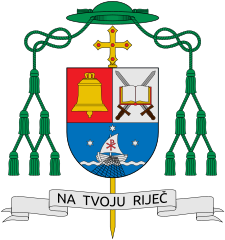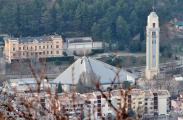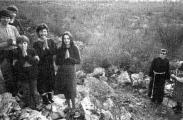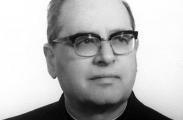The Zagreb weekly 7Dnevno (7 Daily) in their issue of 2 June 2017, allocated pages 28 and 29 to director Jakov Sedlar for him to reply to our reaction titled Calumnies in Film of 26 May this year. Sedlar's statement, either as author or editor, is entitled: What Medjugorje is for Bishop Perić: The Bishops - KGB, UDBA and Pastoral Statements. The day after that, the portal Dnevno.hr published the same.
It appears as if the director wants to apologize to readers for having to wait a week for his answer: “I spent the last few days outside Croatia...”. It seems that it would have been wiser for him if he had taken a few more days or a week to gather his thoughts better, freshen his memory, consult his own archive and study his reply, and then sat down and written with arguments what he considered necessary. This has greatly facilitated our work. What one could have truly expected after our reaction, was that the Russian General Maksimov would come forth and call for a public debate. But, then Jakov Sedlar came forth who suggested that Bishop Perić confront an “employee of the Yugoslav secret service - Lasić”?! Hence, we felt it useful to inform Sedlar that we read his Statement and that with it, he has not closed our mouths or computers. We have no need to add to or correct our previous response. Therefore, this reaction will only have answers and comments on some of Sedlar's statements and claims.
1. The issue of the lawsuit
The director: “I must admit that I was shocked. Along with the despicable lie concerning my ‘intention’ in 1995 to sue the Chancery of Mostar [...]. I do not know what was written in a series of newspaper reviews and interviews in those months after the ‘Gospa’ [Sedlar’s film on Our Lady] was released, for I did not follow them, nor did I authorize any interviews, but I do know that I never thought of suing anyone, not even the Chancery of Mostar. Not for the fact that there was no reason for suing in the opinion of some lawyers, whose opinions I still did not accept” (7 Daily).
Answer: This refers to an interview given by J. Sedlar to Panorama, a political-informative weekly, to the journalist Marko Marković, on 29 November 1995, p. 16-17, titled: Bishop Perić of Mostar, is shamelessly lying and monstrously accuses my “Gospa”. As we have already written in the last two reactions of this Chancery, on 1 December 1995, immediately after realizing the seriousness of the threat, in its response titled “Film Fiction”, the Chancery called for the threat to be realized.
The truth is, and this should be said, that the director does not speak on the lawsuit in the first-person singular, but in the name of the “distributor”. However, since in the part of the interview dedicated to the film “Gospa” the first-person plural dominates in the dialogue - and thereby we heard of the lawsuit only from him and also in the title of the interview it is clearly written: Bishop Perić “monstrously accuses my “Gospa” - our invitation and encouragement to go to court then went to his address. Whether we are right or not, let the director verify this with his producer Igor Prizmić, or read his statement in Nacional (The National) of 9 August 1996, pp. 3-4, where it is apparent that at the time - due to great financial losses – what was mentioned the most, were appeals and calls to go to court.
2. The Writer of the text spoken in the film – The Screenwriter
The director mentioned in Panorama 1995, as well as in 7 Daily in 2017, regarding the story of how the film “Gospa” emerged, that the academic Ivan Aralica, was the author of the script - the screenwriter. In 7 Daily: “First of all, honorable author of the Statement, the screenwriter (writer of the text that is spoken in the film) was not myself, but Ivan Aralica the greatest Croatian author. Hence, the scene of the meeting of Bishop [Žanić] and the senior member of the Yugoslav secret service, was not written by me, I transferred it to film. You should already know this, since you want to be a movie analyst and critic. Meanwhile, Ivan Aralica is not just anybody and he did not accidentally write that scene. He wrote it because Bishop Žanić really did have a series of similar meetings, whether you like this or not.”
Answer: In the interview given by the academic Ivan Aralica to Fr. Božo Goluža, the editor of the diocesan monthly Crkva na kamenu (Church on the Rock), 5/2002, pp.12-15, to the question: “If I'm not mistaken, you wrote the screenplay for ‘Gospa’ [...]", the screenwriter answered: “I'm not the only screenwriter of the film. Others came after me who made the final version. Besides this, even if I had written the final version of the script, between the script and the making of the film, there exists a possibility for changes to be made. However, all of this - the corrections to my script and the making of the film - does not relieve me of the authorship of the major part of the scenes. One of the painful things in my life is the objection that I described bishop Žanić as a collaborator of the communists. My opponents among film critics know that this bothers me, yet they insisted on this as much as they could.” And now the director is insisting in 2017.
In completing his answer, the academic Aralica is more than clear: “If I had known I would not be able to avoid this, I would not have written the script, or I would have written a book before the script which would not have allowed this illusion. With a book, I would have known how to defend the reserved position of the episcopate towards the apparition. My fault, my most grievous fault, for getting involved in this!”
3. The Police that slowly regulated traffic
The director repeats four times his astonishment and asks how in our reaction we could say that “the police slowly regulated traffic”. But the real insinuation is that we said that “the police slowly regulated traffic” at “the time when Fr. Jozo Zovko OFM, Fr. Ferdo Vlašić OFM and Fr. Jozo Križić OFM, were being tried and convicted by the courts”!
Answer: We are convinced that no person of goodwill could have read in our sentence that “the police slowly regulated traffic” at the time when the Herzegovinian Franciscans were being persecuted. And not just them. There were also other priests and lay faithful - especially young people. But since we are to Sedlar “shameless liars”, we refer to the testimony of the associate pastor of Medjugorje at the time, Fr. Tomislav Vlašić OFM, with whom the director himself “was oftentimes in the company of during those years”. He will probably trust him. Specifically, in the publication: A Medjugorje la Madonna è viva. Colloqui con padre Tomislav Vlašić (In Medjugorje the Madonna is alive. Talks with Fr. Tomislav Vlašić), Mestre, 2008, p. 41, Vlašić says: “After about the first anniversary [i.e., in 1982 - hence, about half a year before the “collaboration” of rector Perić and the notorious KGB began according to the film construction], their position [i.e., of the Communists] began to change because they realized that the gathering of people in Medjugorje had no political connotations. A little later, more precisely in the winter of 1983, a new political activity of the authorities of the time “began”, that sought to promote and introduce “religious tourism” and the rapid construction of houses that would serve to that end. After that, the regime completely changed its tactics: it started to exploit the Medjugorje apparitions and the gathering of people for their own interests and material gain.”
4. Bishop Žanić changes his position
The director: “Let's say this, how can one explain the fact (which is not mentioned in your Statement) that Bishop Žanić in his sermon in Medjugorje on 25 July 1981, publicly said before a large gathering of believers: “The children are not lying, everything is true!” This was the first time I heard about this in the movie. I do not know where the authors got it from and it really seems to be the true voice of Bishop Žanić, or am I mistaken?!”
Answer: The director is not mistaken. But again, his assertion is wrong. That is, in our reaction it is clearly written: “What kind of stance the bishop of Mostar had at that time can be found in the film itself, which presents the Bishop’s homily during the Confirmation on 25 July 1981.”
Why Sedlar did not notice this, only he knows. Is the answer found in our interpretation, which in no way contributes to the director's suggestion, that this is the result of “collaboration”?
5. The two bishops in no circumstances are the complete Church
The director of the film “From Fatima to Medjugorje”. “I do not know the authors of the film. I do not know their goals (except for I suppose, that they want, as all authors do, that as many people as possible watch the film) but I did not get the impression that in this film they wanted to defame ‘not only the persons, but also the Church’. ‘Two bishops in no circumstances make the entire Church’.”
Answer: Even though it was not our intention to claim that due to the defamation hurled against the two bishops, that the whole Church had been defamed, we can still say it along the way. St. Ignatius of Antioch (martyred at the beginning of the 2nd century) in his Letter to the Smyrnaeans wrote: Ubi episcopus, ibi Ecclesia - Where there is the bishop, there is also the Church. Hence, without the bishop there is no concept of the concrete Church. However, under no circumstance did we intend to extend the doctrine of papal infallibility to the local bishops. Accordingly, what we said in interpreting the “collaboration” of the bishops: “Doesn’t this say that the authors of this film are defaming the Church herself if the Holy See lauds Bishop Žanić with this kind of treatment, instead of ‘deserved punishment’”?
6. Sedlar and the bishops of Mostar
Why Sedlar, who has “lived, grown up, associated with and still associates with numerous magnificent Croatian priests (both Franciscan and Diocesan) who in many respects have been for him unattainable examples” - for more than twenty years now, has been drawing his bow and shooting his poison arrows at the bishops of Mostar, is not clear to us. If the bishops of Mostar are not an example for him, then of course, he has every right to his own opinion. But, no one has the right to slander anyone, neither by divine nor human law, including Sedlar! Whether now we are telling the truth or slandering Jakov Sedlar, let the readers decide.
First calumny. “What shocked me was that bishop Perić and his office in Mostar wrote a letter against the movie and sent it to 1200 addresses in the United States. Mainly to the offices of bishops and the Catholic Church of America. [...]. 54 million Catholics live in America. We were damaged in a terrible way” (Panorama, 29 November 1995).
The truth. The Chancery Office expressed its opinion on the film solely from an ecclesiastical - religious point of view. It did so on 17 June 1995, i.e., two months after the film began screening in Croatian and other cinemas. “1200 letters” to various addresses, as claimed by the director, were not sent. The Chancellor, on behalf of the Chancery Office, sent the text through the mass-media and the following newspapers published it: Slobodna Dalmacija, 19.VI; IKA, 21.VI; Glas Koncila, 26.VI; Crkva na kamenu, n.7/1995, and indirectly and partially by Obzor, 26.VI., all in 1995.
To be biblical: If Sedlar finds a hundred times less, that is, 12 addresses in America that the Chancery Office of Mostar directly sent a letter to, let him not spare us!
Second calumny. “There is an indication that some of the tapes, were released precisely from Mostar, while the movie was playing at cinemas, which is a criminal offense punishable by a prison sentence of 7 to 15 years” (Panorama).
The truth. The producer of the film “Gospa”, Igor Prizmić, in the Nacional, 9 August 1996, p. 3-4., (14 months after the Chancery Office’s reaction to the film “Gospa”), did not mention even a single word about the “1200 letters” or the possibility that “someone from Mostar allowed the circulation of the cassettes”, instead: “A total of 4.700.000 USD were invested into the “Gospa” film, of which 1.700.000 was invested by Ivan Perković and myself. We find ourselves at this moment, in an extremely unfavorable situation, because none of the investors, including many of my friends and longtime business partners from America and Canada, have not returned a cent.
The American company ‘Penland’ mislead us, to which upon the insistence of Jakov Sedlar, we transferred all the rights. Instead of the proclaimed and promised 400 copies, only 30 copies of the movie were made.”
We ask Sedlar – is it possible that the other 370 copies were unlawfully obtained by bishop Perić – “or someone from his office in Mostar” - and that these 370 copies, while the other 30 copies were being screened at theaters, were sent through “their channels” to various American and world theatres and in this way greatly damaged the director, distributor, author and producer?!
Third calumny. “While the film “Gospa” is in question, bishop Perić in his letter to the Vatican a year ago shamelessly lied, by claiming that the Franciscans and I earned 5,400,000 USD with this film!”
The truth. Bishop Perić never sent a “letter to the Vatican” in which he wrote this! Let Sedlar show the letter!
Fourth calumny. “Given what I know, it seems to me that this part of the movie is quite credible”.
The truth. We are truly interested to know what part is “quite credible”. We believe that all the readers of these accusations and answers are interested as well. We have no objection that all the archives that keep records of the UDBA be made available to the director and that all documents be given to him, which were not given to the bishop despite his courteous request. And let him prove in court the credibility of operation “Crnica” that has over “1000 pages” and all other documents and files and the “co-operation” of bishop Žanić! Let him also call the “operative of the Yugoslav secret services Lasić”, since he already knows where he lives. There is no need to confront bishop Perić, because in this film work he is not presented as associating with the Yugoslavia UDBA or even with Lasić. Does this not seem to be a condition sine qua non for the Director and his credibility?
Fifth calumny. “I'm not the only one who will say that since his arrival as the head of the diocese of Mostar-Duvno, bishop Ratko Perić, he has not brought peace. Unfortunately, he brought distress, conflicts and divided the Croatian people...”
The truth. How bishop Ratko Perić speaks and for which Peace strives for, from his episcopal consecration to this day, is well-known to the Croatian people and to the Catholic faithful. Up until today - and for the director of the “top documentary film” - it was not heard that any objective and impartial Croat and Catholic has said that bishop Perić “brought distress, conflicts and divided the Croatian people” and that he was a “collaborator” of the most notorious secret services of the 20th century, even when the USSR and KGB were falling apart! The bishop's clarity and courage in seeking the rights of the Croatian people are all well known to everyone. If the bishop’s national identity is unclear for J. Sedlar, let him go and ask all the ordinary God-fearing people, from high-positioned politicians and diplomacy, as well as local people and those abroad.
The sixth calumny. “... he has in all possible ways tried and keeps trying to speak of everything worst about Medjugorje. [...] What is lasting is, I would say, his consistent hatred, even towards the thought that Our Lady appeared in Medjugorje. [...]. A huge number of pilgrims has been (and is) humiliated and punished, who cannot fathom the negative passion which with both bishops spoke about Medjugorje.”
The truth. What is lasting, both with bishop Pavao and with bishop Ratko, is the quest for the truth about Medjugorje: the defense of God's truth, Our Lady’s dignity and the image of the Church.
Jesus once said, for our human perception some very strange words, we could say even hard words: “Do not think I have come to bring peace on earth; I have not come to bring peace, but a sword” (Mt 10:34). Will we, after these evangelical words of Jesus, proclaim him a man of distress, conflict, division and struggles, even among his own people? Clearly, Jesus brings peace. He is our Peace. He is the giver of peace, but not the peace that the world gives. Christ's Peace is established in Truth and Justice. One arrives at such peace, as bishop Perić has taken from St. Paul into his bishop's motto, “it is through many persecutions that we must enter the kingdom of God” (Acts 14:22). He did not choose that path, but has been called to that path, and chosen for that path. This is the baptism he is to be baptized with, if the bishop wishes to be an apostle of Christ.
Seventh calumny. “He gave his position ahead of any other commission”.
The truth. The statements of bishop Perić on Medjugorje began after his episcopal ordination in Neum, on 14 September 1992. Let Sedlar prove and publish a single one of the bishop’s public statements before the conclusions of the Diocesan Commissions and the Commission of the then Bishops’ Conference and the Statement of the same BC of 1991!
Let's repeat here again: We are convinced that the film and that this type of “defense” even Sedlar himself are damaging to Medjugorje. For how can we accept that God “blesses” someone’s calumny to reveal the Truth and defend the honour of the Blessed Virgin Mary?!
Eighth calumny. “In those years, I was often in the company of Fr. Tomislav Vlašić, Fr. Slavko Barbarić, Fr. Leonard Oreč and some other Franciscans. Bishop Žanić and later Perić humiliated and punished them. They were very sad, they were unhappy that they could not do their mission in peace.”
The truth. While not considering Sedlar an attorney of individuals or the entire Franciscan community in Herzegovina, we thought we might not comment this statement.
Canon Law of the Church clearly defines rights and duties. If anyone has been wrongfully deprived of his rights, he need not tremble before the Bishop or walk with a “stiffened face”, but he can turn to a higher authority. The decisions of the competent authorities of the Church are equally binding upon bishops and priests, religious men and women, as well as all believers. We are the Catholic Church and not “Christians of a different way”.
Ninth calumny. “Personally, this movie did not provide me anything new except the point that he contacted the high-ranking KGB operative Maximov and vice versa. [...]. Indeed, I'm really unconcerned whether bishop Perić really did drink tea or vodka with Maximov at the Columbus hotel in Rome.”
The truth. We are convinced that Sedlar, as a “movie making” man, knows well all the “tools” that were used to make this defamatory work “From Fatima to Medjugorje”. That which ordinary viewers might consider as somewhat true, and the way this is achieved, is very well known to him. He must have noted that the facsimile which mentions the meeting at the Columbus restaurant in Rome, dated 3 September 1981, and that the “agent” did not drink “tea and vodka in Columbus” with rector Perić, but, according to his “claims”, with a certain Pietro Sambi. From the same “agent” he could have heard (in the 28th minute of the film) that he allegedly “met” with Perić for the first time in December 1982. Hence, about 15 months after Sedlar's “tea or vodka”. If he did not notice this, then how could the movie be rated as “top quality”?!
Why did he need all of this?
We conclude, not only this review of Sedlar's statement, but also any public-media debate on this topic. And obviously, not because we have run out of arguments, but because we do not think it makes any sense to bother readers and further. Following all the calumnies of the film and Sedlar, the Chancery Office of Mostar, would have a moral obligation, as well as human and civil right, that for all these calumnies, to bring the defamers before the earthly courts and thereby defend the personal integrity and the episcopal dignity of the two leaders of this local Church. It is humanly and ecclesiastically hard to look at and allow everybody, whenever it comes to their minds, to irrationally slander the shepherds of these local churches and bring distress to the hearts of the faithful.
The Psalmist, aware of the time in which he lived, exclaimed: “And now, Lord, for what do I wait? My my hope is in thee” (Ps 39:7). Therefore, knowing that the only Righteous and True judgment is that of the Lord, before whom we will all appear, faster than we think, we entrust to Him the life and work of our shepherds. And to our readers we convey: The Truth always sees the light of day no matter what darkness or grave it may be hidden in!
Mostar, 7 June 2017
Fr. Željko Majić
Vicar General




